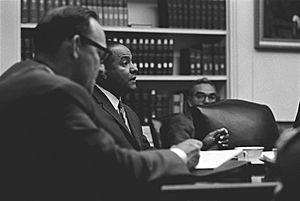Carl Rowan facts for kids
Carl Thomas Rowan (born August 11, 1925 – died September 23, 2000) was an important American journalist, writer, and government official. He wrote newspaper articles that were published all over the U.S. At one point, he was the highest-ranking African American in the United States government.
Contents
Carl Rowan's Life and Career
Carl Rowan was born in Ravenscroft, Tennessee. His mother, Johnnie, was a cook and cleaner. His father, Thomas Rowan, stacked lumber. Carl grew up in McMinnville, Tennessee, during a tough time called the Great Depression. He was determined to get a good education.
He finished Bernard High School in 1942. He was class president and the top student. After high school, Carl worked cleaning porches at a hospital. This helped him attend Tennessee State College. He studied at Tennessee State University and Washburn University.
Carl was one of the first African Americans to become an officer in the United States Navy. He was also part of the Omega Psi Phi fraternity. He graduated from Oberlin College in 1947. He then earned a master's degree in journalism from the University of Minnesota in 1948.
Starting His Journalism Journey
Carl began his writing career at African-American newspapers. These included the Minneapolis Spokesman and St. Paul Recorder. He later worked as a copywriter for The Minneapolis Tribune. From 1950 to 1961, he was a staff writer. During this time, he wrote a lot about the Civil Rights Movement.
In 1960, Carl was not allowed to join a club because it was racially segregated. This event inspired the song "I Belong to a Private Club." In 1964, Carl talked about his reporting on the civil rights movement. He shared his thoughts on differences between the North and South. He also spoke about unfair treatment and the political power of African Americans.

Serving in Government
In 1961, President John F. Kennedy appointed Carl Rowan as Deputy Assistant Secretary of State. The next year, he was a delegate to the United Nations during the Cuban Missile Crisis. This was a very serious time for the country.
Carl became the U.S. Ambassador to Finland in 1963. In 1964, President Lyndon B. Johnson made him director of the United States Information Agency (USIA). As director of the USIA, Carl became the first African American to be on the United States National Security Council. This made him the highest-ranking African American in the U.S. government at that time.
Later Career and Achievements
From 1966 to 1998, Carl wrote a popular newspaper column. It was published in the Chicago Sun-Times. From 1967 to 1996, he was also a panelist on a TV show called Agronsky & Company. This show later became Inside Washington. Carl was known for his fair and balanced arguments. He was often seen as a voice of reason.
Carl Rowan was a very famous and honored journalist. His columns appeared in over one hundred newspapers across the country. In 1995, he was a finalist for the Pulitzer Prize for his writings. He is the only journalist to win the Sigma Delta Chi medallion for excellent journalism three years in a row.
In 1968, he received the Elijah Parish Lovejoy Award. He also got an honorary Doctor of Laws degree from Colby College. In 1997, the NAACP gave him the Spingarn Medal.
Thurgood Marshall, a Supreme Court Justice, gave his only interview while on the court for Carl Rowan's 1988 documentary. The National Press Club gave Carl its 1999 Fourth Estate Award for his lifetime achievements. On January 9, 2001, the press briefing room at the State Department was named the Carl T. Rowan Briefing Room in his honor.
Carl Rowan passed away in Washington, D.C., on September 23, 2000. He was 75 years old. He was survived by his wife, Vivien, and their three children: two sons, Carl Jr. and Jeffrey, and a daughter, Barbara. Barbara followed in her father's footsteps and became a journalist. Carl also had four grandchildren.
Carl Rowan and the Montgomery Bus Boycott
In the late 1950s, Carl Rowan reported on the growing Civil Rights Movement in the South. This included the 1955 Montgomery Bus Boycott in Alabama. This boycott started after Rosa Parks refused to give up her bus seat to a white passenger. Carl was the only black reporter covering this story for a national newspaper. He became good friends with the boycott's leaders, including Martin Luther King Jr..
Once, news of a false agreement to end the boycott reached Carl. He quickly told Dr. King. King then worked fast to correct the story before it appeared in a local newspaper. This helped make sure the boycott continued until its goals were met.
Project Excellence
Carl Rowan started Project Excellence in 1987. This program offered college scholarships to black high school seniors. It was for students who showed great writing and speaking skills. Carl created Project Excellence to help students overcome negative ideas about black students. He wanted to reward students who worked hard and did well in school.
A group of journalists, community leaders, and school officials led the program. Students from public, private, and church schools in the Washington, D.C., area could join. This included parts of Virginia and Maryland. By the year 2000, Project Excellence had given out $26 million in scholarships. Over 1,150 students received help.
 | Selma Burke |
 | Pauline Powell Burns |
 | Frederick J. Brown |
 | Robert Blackburn |

